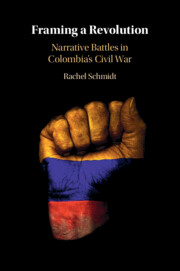Book contents
- Framing a Revolution
- Framing a Revolution
- Copyright page
- Dedication
- Epigraph
- Contents
- Figures
- Tables
- Preface
- Acknowledgments
- Abbreviations
- I What’s in a Frame?
- II A History of (Gendered) Violence in Colombia
- III Navigating Disarmament, Demobilization, and Reintegration in Colombia
- IV Framing Victimhood
- V Contesting the Victimhood Frame
- VI Framing a Revolution
- VII Countering the Revolution Frame
- VIII Deserters versus Loyalists
- IX Contesting the Deserter Frame
- X Framing Reintegration
- Book part
- Bibliography
- Index
X - Framing Reintegration
Published online by Cambridge University Press: 02 March 2023
- Framing a Revolution
- Framing a Revolution
- Copyright page
- Dedication
- Epigraph
- Contents
- Figures
- Tables
- Preface
- Acknowledgments
- Abbreviations
- I What’s in a Frame?
- II A History of (Gendered) Violence in Colombia
- III Navigating Disarmament, Demobilization, and Reintegration in Colombia
- IV Framing Victimhood
- V Contesting the Victimhood Frame
- VI Framing a Revolution
- VII Countering the Revolution Frame
- VIII Deserters versus Loyalists
- IX Contesting the Deserter Frame
- X Framing Reintegration
- Book part
- Bibliography
- Index
Summary
When studying insurgency and civil war, understanding different exit pathways from violence could, ideally, help to prevent the resurgence of that violence. But criminologists have long stated that desistance from violent groups is notoriously difficult to measure: people might disengage from violence but still be committed to their group in other ways, or they might disengage temporarily, only to rejoin the group or commit violence in other ways or with different groups later on. Understanding why people join violent rebellions is not enough to understand the full trajectory of participation in armed activity – especially when a lot of that understanding is built on why men join violent rebellions. It is also critical to understand why both men and women stay, why they leave, and/or why they return after having disarmed. Desertion, perceptions of threat, and armed group fragmentation also cannot be understood at only the organizational level, nor at only the individual level. This chapter discusses how these phenomena are linked together: how these groups frame reality and threats to build cohesion and collective identities, and how their recruits interpret or dispute these frames.
Information
- Type
- Chapter
- Information
- Framing a RevolutionNarrative Battles in Colombia's Civil War, pp. 250 - 276Publisher: Cambridge University PressPrint publication year: 2023
